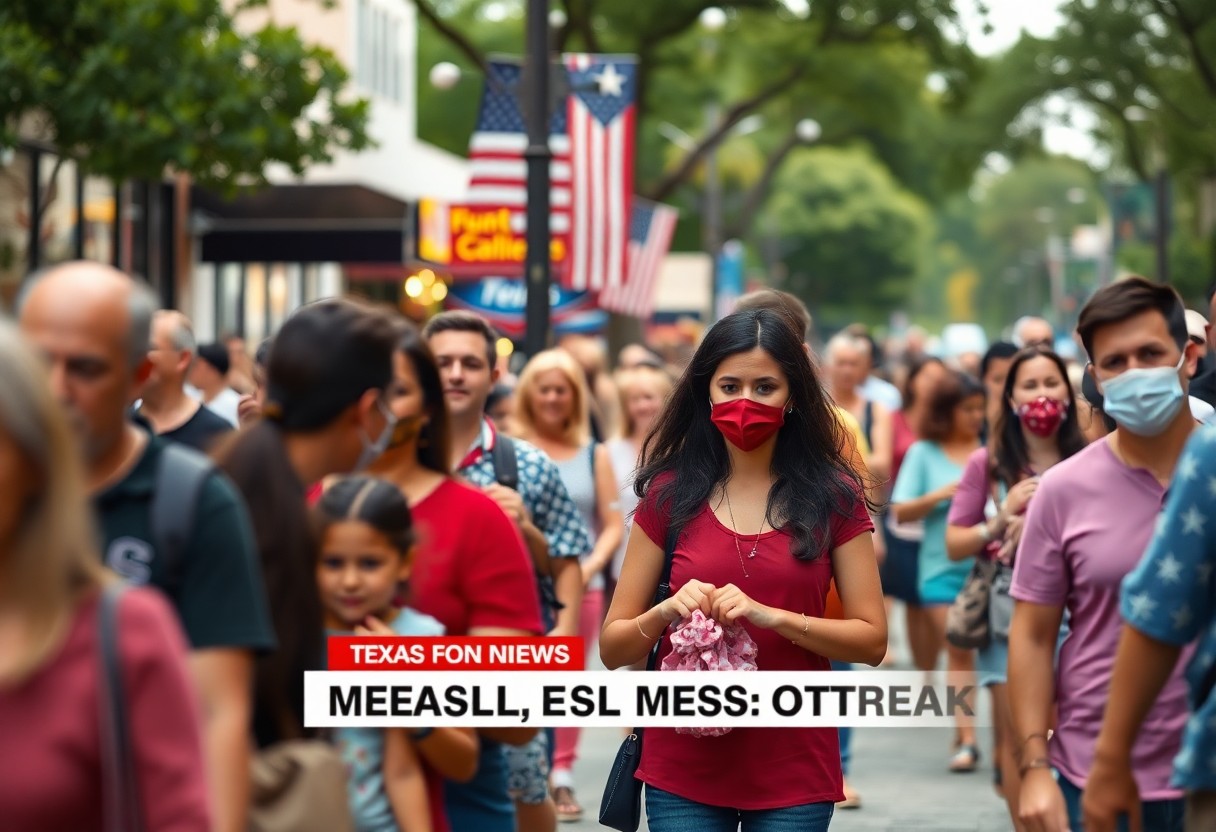Current Outbreak Status
Assuming you are aware of the current situation, the rapid spread of measles in rural Texas is alarming health officials and experts. Reports indicate an increase in cases not just in Texas but also in other states, highlighting a serious public health concern that you should take seriously. With measles being one of the most contagious diseases known, your level of immunization is necessary for both individual and community safety.
Health Authority Warnings
An alarming trend has emerged, as health authorities warn that the number of measles cases could rise significantly in the coming weeks. Virologist Gregory Poland emphasizes the urgency of vaccination, stating that unvaccinated individuals are at high risk if exposed to an infected person. This is particularly concerning in areas where vaccination rates have declined significantly.
Another important point is that experts express concern for the broader implications of this outbreak. Deborah Fuller highlights that declining vaccination rates can lead to outbreaks of other vaccine-preventable diseases, making it an urgent issue that you should be aware of. With 95 percent community vaccination needed for herd immunity, your participation in vaccination efforts can help mitigate the risk of further outbreaks.

Expected Case Increase
You should be aware that health authorities are predicting a significant rise in measles cases in the coming weeks, particularly in rural areas of Texas. The highly contagious nature of the virus means that if you are not immunized, the risk of contracting measles is alarmingly high—if exposed, you may develop the illness within just 12 hours.
Expert Assessments
Assuming the current trend continues, experts are increasingly concerned about the implications of declining vaccination rates. The spike in cases is indicative of an undervaccinated population, suggesting that outbreaks of other vaccine-preventable diseases might soon follow if measures are not taken.
Projections from health experts indicate that around 95 percent of a community must be vaccinated to halt the spread of measles effectively. However, localized pockets of unvaccinated individuals can still lead to outbreaks, even in areas with higher overall immunization rates. This trend raises alarm because it signifies potential health risks beyond just measles, threatening the broader community’s safety.
Population Immunity Levels
If vaccination rates dip below 95 percent, populations become vulnerable to outbreaks of highly contagious diseases like measles. The current rise in measles cases in Texas serves as a warning sign that herd immunity is being compromised, putting both unvaccinated individuals and the wider community at risk.
Community Protection Requirements
You should be aware that in order to effectively prevent the spread of measles, at least 95 percent of your community needs to be vaccinated against the virus. This level of immunization is vital to create herd immunity, which protects those who cannot be vaccinated, such as infants and individuals with certain medical conditions.
Population immunity is a collective benefit that relies on the participation of the community. When sufficient members are vaccinated, the spread of measles can be contained, reducing the risk for everyone, especially those most vulnerable. It is important to acknowledge that isolated pockets of unvaccinated individuals can trigger outbreaks even in larger communities with higher immunization rates. Your engagement in vaccination efforts plays a vital role in maintaining community health and resilience against infectious diseases.
Recommended Schedule
Guidelines suggest that children receive their first dose of the measles, mumps, and rubella (MMR) vaccine between 12 and 15 months of age, followed by a second dose between 4 and 6 years. As an adult or teenager, you should verify with your healthcare provider that your vaccinations are up to date to ensure you are protected from the virus, especially in light of the rising measles cases reported in rural Texas.
Special Considerations
Little attention is often given to individuals who might require special vaccination considerations, such as those with compromised immune systems, who may not respond effectively to standard vaccinations. For these individuals, it is recommended that you consult your healthcare provider for tailored advice regarding measles vaccination and protection.
It is crucial to acknowledge that some individuals may be at a higher risk due to their health conditions or life stages. For instance, those who have undergone certain cancer treatments may lose immunity and benefit from a re-evaluation of their vaccination needs. Since measles is exceptionally contagious, staying informed about your vaccination status and seeking appropriate advice can protect you and those around you from potential outbreaks in communities with declining immunity levels.

Disease Severity
Now, it’s important to understand that measles is not just a routine viral infection; it is an extremely contagious disease that can cause severe health issues. If you are unvaccinated and exposed to the virus, you have a high likelihood of contracting it, with nearly 95% of non-immunized individuals developing the illness after exposure. The severity of the disease can lead to life-threatening complications, making vaccination a vital protective measure.
Potential Complications
Assuming that you do contract measles, be aware of the potential complications that may arise. Common issues include ear infections and diarrhea; however, more severe complications like pneumonia and encephalitis can occur, leading to permanent brain damage.
Severity of measles complications cannot be overstated. Although some individuals may experience mild symptoms, a significant number of cases develop into serious health problems. Pneumonia is particularly dangerous, as it is responsible for the majority of measles-related deaths. Encephalitis, while less common, can lead to lasting neurological issues. Hence, ensuring that you and your loved ones are vaccinated is critical to preventing these severe outcomes.
Current Initiatives
With the rise in measles cases in Texas, state and local health authorities are ramping up public awareness campaigns to encourage vaccinations. They are focusing efforts on reaching unvaccinated populations through community outreach, educational materials, and vaccination clinics to mitigate the spread of this highly contagious disease.
Vaccination Trends
While vaccination rates have historically remained high, recent data indicates a troubling decline in immunization, particularly among certain demographics. This trend is concerning as it creates pockets of susceptibility within communities, heightening the risk for outbreaks like the one currently observed in Texas.
It is crucial for you to be aware that 95 percent of a community must be vaccinated to achieve herd immunity against measles. However, some areas have seen immunization rates drop below this threshold. As a result, more outbreaks of vaccine-preventable diseases are likely, putting you and others at increased risk. Staying informed and ensuring that you and your loved ones are up to date on vaccinations is critical in the efforts to reverse this trend.
Author Background
Now you know that the insights in this article come from Don Rauf, a seasoned freelance health writer with over 12 years of experience. He has contributed to reputable outlets such as HealthDay, CBS News, and WebMD, covering various health topics. With a strong background in writing and a passion for educating readers, Rauf aims to shed light on pressing public health concerns like the current measles outbreak in Texas.
Additional Resources
Author of this article will direct you to valuable resources to better understand measles and vaccination. You can explore the CDC’s guidelines on measles prevention and treatment, as well as access comprehensive information regarding the MMR vaccine. Staying informed is important, particularly as health authorities warn of rising cases linked to decreasing vaccination rates, with 95% of the population needing immunity to halt transmission.
Resources such as the CDC provide the latest updates on measles outbreaks and vaccination recommendations. They offer important information on what symptoms to watch for and how to protect yourself and your loved ones. As health concerns continue to grow, these resources will empower you to take informed actions that can help safeguard your health and that of your community.
Vaccine Information
One key to protecting yourself and your loved ones from measles is ensuring you are up to date on the MMR vaccine, which covers measles, mumps, and rubella. If you have not received two doses, or if you are unsure about your vaccination status, consult your healthcare provider. Achieving and maintaining a vaccination rate of at least 95 percent in your community is crucial to create herd immunity and help prevent outbreaks.
Outbreak Updates
Some alarming trends have emerged as health authorities report an increase in measles cases, particularly in rural Texas. This spike in measles cases serves as a sign that vaccination rates are declining, which could lead to further outbreaks of vaccine-preventable diseases. You should stay informed about these developments, especially if you are in or near affected areas.
Another critical update highlights that as measles continues to spread, it is crucial to keep track of new case numbers reported weekly. With health officials warning of more sickness expected in the coming weeks, vigilance is necessary. Making sure you and your family are vaccinated is your best defense against this infectious disease, as measles can have severe health implications if contracted.
Disease Overview
An outbreak of measles is currently affecting rural Texas, highlighting the need for vigilance. This highly contagious virus spreads swiftly and can be life-threatening, often manifesting with a distinctive blotchy rash. As cases rise, health authorities emphasize that vaccination is vital, as 95% of a community must be immunized to achieve herd immunity and prevent further transmission.
Treatment Options
Treatment for measles primarily focuses on relieving symptoms, as there is no specific antiviral therapy. You should consult your healthcare provider for guidance, especially if you have underlying health issues. Most individuals who have received the MMR vaccine do not require a booster, but those with reduced immunity may benefit from additional doses.
Disease management for measles typically involves supportive care, including hydration and fever management. Common complications can arise, such as ear infections and pneumonia, so it’s vital to remain vigilant for any worsening symptoms. Vaccination remains the best preventive strategy, ensuring your long-term protection against this serious disease.
Travel Advisories
There’s an urgent need for caution if you’re planning to travel, especially to rural Texas, where measles cases are on the rise. The highly contagious nature of the virus means that unvaccinated individuals are at a greater risk. Before you travel, ensure that you and your family are up to date on your MMR vaccination to protect yourselves and others from potential outbreaks.
CDC Guidelines
Little is more important than adhering to CDC guidelines, particularly during this outbreak. The CDC recommends that you check your vaccination status and ensure you’ve received the MMR vaccine, especially if you plan to travel to areas currently experiencing higher transmission rates. Those who have received two doses of the vaccine typically don’t require a booster.
Understanding the CDC guidelines is paramount in this context. The organization emphasizes that people born after 1957 should have received at least one dose of the MMR vaccine, and those in higher-risk categories may need additional doses. Many vaccine-preventable diseases, including measles, thrive in communities with low vaccination rates, making it even more crucial for you to verify your immunization and encourage others to do the same. Protecting yourself and your community helps to combat this growing threat.


